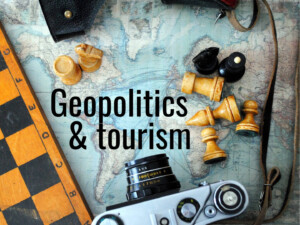Would you abolish taxes on tips?

Abolishing taxes on tips is a promise made by both US presidential candidates. Based on where you are, and your experience of tourism and hospitality, what do you think of the policy?
It’s a “Good Tourism” Insight Bites question.
Your correspondent put the question to the travel & tourism stakeholders in the “GT” network, inviting responses of no more than 300 words. (You too can join the “GT” network. Register.)
And thanks to Richard Butler for his “GT” Insight BiteX, and Rieki Crins for her “GT” Travel Experience. (You too can share your opinions and inspirations with “GT”.)
Bites menu
- ‘And an end to fossil fuel subsidies’
- ‘Go after those who don’t pay taxes at all’
- ‘Fair and appropriate pricing is much preferable’
- ‘Tips are a lifeline for many workers’
- ‘Practical benefits may be limited’
- “GT” Insight BiteX (‘X’ is up to you)
- Mass tourism ‘more sustainable per capita than many other forms’
- “GT” Travel Experiences
- ‘Thai people are the kindest in the world’
- What do you think about taxes on tips?
- Featured image (top of post)
- Previous “GT” Insight Bites
‘And an end to fossil fuel subsidies’
Geoffrey Lipman, President & co-founder, SUNx Malta
Why not add “And an end to fossil fuel subsidies”?
If you are putting in a tax break to appeal to a minority who may be poorly paid, why not go a step further and help save everyone!?
SUNx Malta is a valued “GT” Partner.
‘Go after those who don’t pay taxes at all’
John Morris Williams, Group General Manager, Sanakeo Boutique Hotel & Flora by Sanakeo, Laos
My view here in Laos is that there should be no taxes on service charges. They should go after those who don’t pay taxes at all.
SVC is for our staff who work hard to show their guests from all over the world that Laos is a great destination to visit.
When our staff serve customers and go above and beyond the call of hospitality, should part of their income be taken away?
It’s hard enough for them to live in a nice manner with the inflation; not to mention the bullsh*t inflation when local vendors of local produce blame the Thai baht (THB).
It seems everything we touch is taxed time and time again!
‘Fair and appropriate pricing is much preferable’
Richard Butler, Emeritus Professor of Tourism, University of Strathclyde, Scotland
This is an unimportant issue, except to those who rely on such tips for their income.
Firstly, in the current context it only applies to the USA, where tipping has reached an absurd level compared to most other countries, and is therefore irrelevant to most of the world.
Secondly, it will make little or no significant difference to tourists or tourism. Most tourists are more worried about whether they should tip or not, and, if they decide to tip, what is an “appropriate” level for the country they are in.
In general tipping is a minefield. I think most people would prefer the situation in New Zealand, Australia, and Singapore at least, where tipping is generally unexpected or minimal and treated as optional; at times even insulting.
Fair and appropriate pricing is much preferable.
‘Tips are a lifeline for many workers’
Shamiso Nyajeka, Head of Department, Kirirom Institute of Technology, Cambodia
At the end of my first month working in passenger services at Zimbabwe’s busiest airport, I felt a deep sense of accomplishment. As I pulled a small stash of notes from under my mattress, everything suddenly seemed worth it.
As the newest team member, I was assigned to handle wheelchair passengers. Being small-framed, I often found myself awkwardly pushing people twice my size. My heart raced as I gripped the wheelchair handles, especially when navigating the steep ramp to the arrivals hall. Some wheelchairs had faulty brakes, and I constantly feared losing control.
Many passengers looked at me with concern, asking, “Are you sure you can do this?” or “Why don’t they give this task to the men?” But after safely delivering them through immigration and baggage claim, their heartfelt thank-yous and tips made it all worthwhile.
That first month, I saved nearly $250 in tips, enough to support my extended family. In many African cultures, this is known as “black tax”; an unspoken obligation to care for family without distinction between ‘immediate’ and ‘extended’. Though they are small gestures of appreciation, tips are a lifeline for many workers.
While my tips were not taxed, I can only imagine how devastating it would have been if they were. I am sure my colleagues and many other frontline workers would have felt the same way. Taxes would have significantly reduced our ability to support our families.
Though the American context may differ, frontline workers everywhere share common ground: they work tirelessly, often under challenging conditions, to deliver exceptional service.
Abolishing taxes on tips isn’t just logical; it is essential. Tips are more than a reward; they are a vital source of support, and taxing them adds an unnecessary burden to an already demanding job.
‘Practical benefits may be limited’
Richard A Shepard, Trustee & CEO, Sustainable Rural Development International, UK
While the promise to eliminate taxes on tips is politically appealing, and aims to support service workers, its practical benefits may be limited.
Tips in the US are considered income and should be declared. Are they? Who knows … but likely not, or not in full.
This is a political and revenue issue. It has nothing to do with anything else in the US. The idea is to lift the financial burden on approximately 4 million workers in tipped positions.
There are several issues to overcome:
- First, it requires legislation.
- Harris couples her proposal with a minimum wage increase, and income limits to prevent misuse by higher earners.
- Trump’s proposal lacks details but aims to provide immediate relief to workers who rely on tips. (Don’t expect details from Trump. It’s just a political ploy.)
- Eliminating taxes on tips will lead to significant revenue losses for the federal government; potentially $107 billion to $250 billion over the next decade, depending on details in the legislation. This raises concerns about budget deficits and funding for social security and healthcare.
- Many tipped workers may not benefit. For instance, a worker earning a low wage supplemented by tips may already fall below the taxable income threshold. Thus, exempting tips from taxation may not change their obligations at all.
- The policy could create inequities in the labour market, favouring tipped workers over those in non-tipped positions. It may encourage employers to shift compensation structures towards tips rather than wages, further complicating wage fairness across different sectors.
In Europe, tips are either not taxed or not fully declared. It has zero impact on tourists, even in the US.
“GT” Insight BiteX (‘X’ is up to you)
The “Good Tourism” Blog offers a great opportunity to any travel & tourism stakeholder who wishes to express themself in writing for the benefit of “GT’s” open-minded readers.
To feature in the next “GT” Insight Bites compilation, send no more than 300 words (300 words or fewer (</=300 words)) on any tourism-related idea or concern you may have.
Don’t use AI. if you lack confidence in writing in plain English, “GT’s” publisher will personally help with copy editing. “GT” doesn’t judge. “GT” publishes.
Send your “GT” Insight Bite and picture to [email protected].
Mass tourism ‘more sustainable per capita than many other forms’
Richard Butler, Emeritus Professor of Tourism, University of Strathclyde, Scotland
Some 30 years ago a colleague of mine listed 135 ‘types’ of tourism. I have no idea how many he would record today. Some — ‘alternative tourism’, for example — have just about disappeared from use. Many others have appeared.
While some are adjectives describing the activities engaged in — ‘cycling tourism’, for example — it seems an increasing number are more ideological, or are focused on the “nature” or “appropriateness” of tourism. Many are new labels for old products. Some recent comments on regenerative tourism make it sound like a version of ’slow tourism’ or ’agritourism’.
Academics do nobody any favours by coming up with new names for old niches. But it is easy for proponents to hype “the fastest growing” — a doubling from two to four is not difficult — to increase the use of the new term.
Over the decades, some academics, myself included, have argued that mass tourism is not as bad as it is often painted; that it can be more sustainable per capita than many other forms of tourism, particularly those requiring long-haul air travel.
Mass tourism grows despite endless criticism from academics and travel writers. Many people want it. Mass forms of tourism are the only ones they choose to, or can, enjoy.
Many destinations want it too. (Had developers and governments planned properly, overtourism might not be the problem it is in many places.)
Tourism has benefits and costs, but creating more forms, often in name only and with little popular appeal, does nothing meaningful to solve its very real problems.
Making mass tourism more sustainable, as argued by myself and others including Weaver (2012, 2014), would be more effective than trying to replace it with more expensive and sometimes less sustainable alternatives.
Ordinary people eating bread often seem happier than the select few eating cake.
“GT” Travel Experiences
What sparked your passion for travel & tourism? What continues to drive it?
Share a “Good Tourism” Travel Experience at The “Good Tourism” Blog’s sibling site The “Good Tourism” Travel Blog: Informed inspiration for travellers from tourism insiders.
Write ~300 words for a “GT” Travel Postcard or up to 1,000 words for a ‘full’ “GT” Travel Experience. Share a memory or impression; suggest an itinerary for your favourite destination; describe the highlights of an incredible journey; offer tips and advice on how to get the most of travel … In the “GT” tradition of openness, the floor (within reason) is yours!
Supply one or a few of your very best photos (optional). Don’t use AI. If you lack confidence in writing in plain English, “GT’s” publisher will personally help with copy editing.
“GT” doesn’t judge. “GT” publishes.
‘Thai people are the kindest in the world’
Rieki Crins, Founder of the Learning Exchange Foundation, Netherlands & Founder, the Bongde Institute of Hospitality and Tourism, Bhutan
Thailand is kind of a second home for me. I have been visiting the country for more than 40 years.
Although Thailand receives so many tourists every year, I realise that most visitors have no clue about the etiquette and way of life of the Thai. This is a shame because they miss the essence of Thai culture.
Sadly, in the overrun tourist traps of the country, the fine Thai culture has been pushed away to accommodate visitors’ bad behaviour.
If you learn the real Thai culture — open your mind and do not judge — a magical world will open. Avoid the tourist traps, and you will experience a very sophisticated culture … continue reading at The “GT” Travel Blog
What do you think about taxes on tips?
In a comment below share your own thoughts about tips, taxes, or anything travel & tourism. SIGN IN or REGISTER first. (After signing in you will need to refresh this page to see the comments section.)
Or write a “GT” Insight or “GT” Insight Bite of your own. The “Good Tourism” Blog welcomes diversity of opinion and perspective about travel & tourism, because travel & tourism is everyone’s business.
This is an open invitation to travel & tourism stakeholders from any background to share their thoughts in plain English with a global industry audience.
“GT” doesn’t judge. “GT” publishes. “GT” is where free thought travels.
If you think the tourism media landscape is better with “GT” in it, then please …
Featured image (top of post)
Would you tax tips? Pic by Sam Dan Truong (CC0) via Unsplash.
Previous “GT” Insight Bites
- Three critics walk into a bar …
- How are emerging technologies transforming the travel & tourism industry?
- What does it mean to be critical of tourism?
- What constitutes ‘progress’ for travel & tourism in 2024?
- Considering a career in tourism? Important things you should know in 2024
- What did tourism learn from the COVID-19 pandemic?
- In 2024, what are the best opportunities for tourism over the next five years?
- Tourism’s biggest challenges & threats over the next five years to 2028
- On empowerment, promotion, and the power of expression
- On enrichment, repatriation, the double-edged blade, and war
- On tourism technology, progress, and local benefit-sharing
- Hey, travel & tourism, are you ‘neocolonialist’?
- Who’s the new boss? Asia Pacific tourism industry association seeks leader
- ‘The hospitality industry offers a great career.’ Really?
- Cruise ships: Blessing or blight?
- Tourist vs traveller: What’s the difference?
- The heads of finance, operations, and PR walk into their boss’s office …
- Yes, Tourism Minister
- What are tourism’s biggest challenges & threats over the next five years?
- ‘Tourism is built on the backbone of white supremacy’. What do you think?
- Really, what’s the difference? ‘Sustainable tourism’ vs ‘regenerative tourism’
- Want a career in tourism? Important things you should know
- Diverse perspectives on travel & tourism and a fairer world
- Diverse perspectives on economic degrowth and tourism
- Diverse perspectives on visitor dispersion











